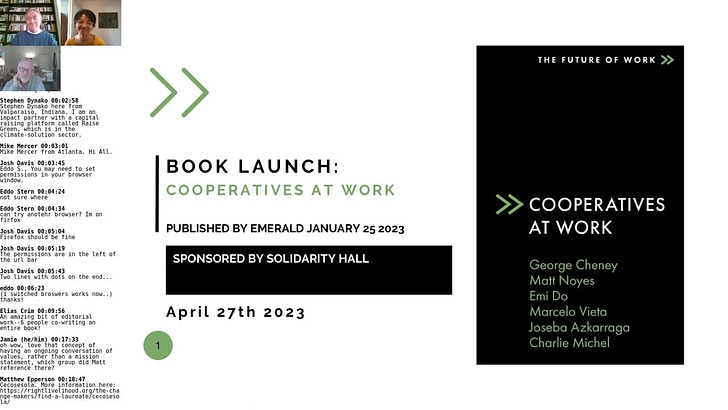Marjorie Kelly interview; Co-ops at Work; Changing Housing Policy
The Deep System Change We Need
Last week, my friend and colleague Elizabeth Garlow and I had a great conversation with the Democracy Collaborative’s Marjorie Kelly about her new book, Wealth Supremacy. Among other virtues, it’s an amazing exercise in fundamental myth-busting, myth that are the very building blocks of How the World Works Today:
Myth #1: No amount of wealth is ever enough—assets must limitlessly expand.
Myth #2: Expanding wealth is a sacred obligation (i.e., a fiduciary duty)
Myth #3: The first duty of government is to protect wealth, thus no takings of property from propertied elites.
Myth #4: Workers are not members of corporations—membership is reserved for owners of capital.
Myth #5: Income to capital (“profit”) is always to be increased, while income to labor (“expense”) is always to be decreased (i.e., rules of the income statement).
Myth #6: Gains to capital are real (“material”), while social and environmental damages are not real (not material, according to the rules of corporate and financial accounting).
What Kelly identifies as the supremacy of wealth is like race bias or sex bias—except it’s a bias toward capital/wealth that has become an automatic process requiring a systems change, not just disciplining the billionaires. At this late date, she describes reformist ideas like “the ESG mirage” and “moral capitalism” as making about as much sense as talking about “moral racism.” In her arguments here, Kelly is simply going down to the unexamined roots of our extracted condition—powerful stuff.
If you purchase the book from the publisher’s website linked above, you can receive a 30% discount (just enter the discount code FRIENDS).
Here’s our conversation with Marjorie:
Successes of Economic Democracy
If you missed the Solidarity Hall book launch for “Cooperatives at Work” back in April, the video is now posted here:
The authors of this highly readable collection of co-op success stories are George Cheney (U. of Colorado), Matt Noyes (co-op education consultant), Emi Do (co-op and ag systems consultant), Marcelo Vieta (U. of Toronto), Joseba Azkarraga (U. of Mondragon), and Charlie Michel (Mission West Community Devt Partners).
The book is a true collaboration. As opposed to a collection of separate essays, the chapters are all co-written by the authors, touching on the way worker co-ops and cooperativism intersect with:
Democracy, Equity and Justice
Innovation to Transformation
Community to Solidarity
Cooperative Ecology
Cooperative Education
This wonderful survey of cooperative practice and social dynamics is international in scope with a strong emphasis on the grassroots values of the solidarity economy. No mere dry analysis here but a discussion in which co-ops are viewed, like labor unions, as countervailing forces of resistance, even engines of self-management (or augestion in Argentine Spanish).
Beyond somewhat-known examples of cooperativism like Mondragon, the authors discuss the 2001 worker takeover of factories (the empresas recoveradas) in Argentina, including the running of entire neighborhoods via direct democracy. Then there’s the explosion of co-ops (especially social co-ops) in South Korea after 2012 when Seoul’s mayor Park Won-Son offered significant support, resulting in the creation of 25,000 new enterprises in the years following. And the story of the rise of the MST Movement of Brazil’s landless workers and peasants.
Highly recommended!
New Stuff from the Democracy Policy Network! (The Anti-ALEC!)
This is the explainer video from the Democracy Policy Network’s homepage.
If you haven’t checked out the DPN, here’s how they describe their work:
Democracy Policy Network is an interstate network that organizes policy support for the next generation of state leaders working to deepen democracy in statehouses across America.
By organizing policy experts, volunteer researchers, and statehouse leaders to gather, organize, and champion a transformative, deep-dive policy agenda spanning every state issue, we aim to accelerate the democratic transformation of America.
The DPN has just released three new policy kits, authored by Colleen Herrmann, on empowering tenants through increasing housing supply and enshrining tenant protections in state and local law:
1. Social Housing: On how states can enable and empower the creation of municipally-owned, mixed-income housing developments
Read DPN's kit on Social Housing
2. Limited Equity Housing Cooperatives: On how states can support the cultivation of affordable, tenant-owned housing developments
Read DPN's kit on Limited Equity Housing Cooperatives
Tenant Bill of Rights: On how states can protect tenants, limit evictions, and increase tenant power in landlord-tenant relations
Read DPN's kit on a Tenant Bill of Rights
If you have friends who are thinking they might Run For Something (a partner org of the DPN) or who are interested in helping make progressive policies part of the public discussion in their state, share a link to the DPN—they’re doing great work.
See you next time—peace.




